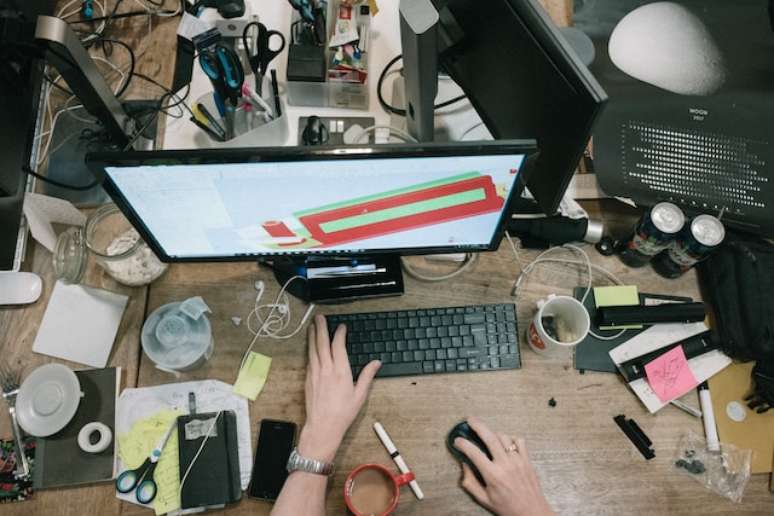Understand the psychological impact of household clutter on your mental health and start taking better care of your mind and your home
Disorder in the external environment is a reflection of internal disorder. Research increasingly shows the negative impact that disorder has on mental health. It’s not lack of time, it’s not relaxation. In many cases, studies indicate, it is a reflection of our own anxious, stressed and chaotic mind.
For some reason your home must have already become messy, at least for a few days. Work emergencies, an unexpected visit, health problems, celebrations and other events lead to increased use of items. And, moreover, they cause an increase in the movement of people. Therefore, they carry this feeling that everything is messed up.
You may have looked at all the dishes in the sink and clothes piled up without knowing where to start a good cleaning. And at the same time you have to respond to messages on your cell phone. All this leads to a feeling of pressure.
In addition to the problem of cleanliness, disorganization can impact the perception of the environment and cause anxiety, affecting overall health. I’ll help you figure it out.
We are not multitaskers!
The multiple stimuli study, published in the Journal of Neuroscience, showed that visual clutter in the environment can interfere with the brain’s ability to process information and make decisions.
In this study, researchers found that when there is a lot of visual information, the activity of the amygdala and prefrontal cortex increases in activity. The amygdala is the area of the brain responsible for processing emotions and in which it participates stress chain. And the prefrontal cortex is the area of the brain that makes decisions and plans.
These brain areas make up the emotional and cognitive control circuitry. Therefore, constant exposure to disorganized, information-overloaded environments can lead to an increase stress and anxiety. This happens because the brain is not prepared to multitask.
Although it may seem like we do more than one thing at the same time, this is not true. Believing ourselves to be a multitasker means building a wrong perspective of ourselves, comparing ourselves, taking it for granted that another human being has this ability.
It is important to demystify the idea of multitasking as if it were a superpower, as this is not available to any human being.
Invisible competition for attention
The study conducted by Princeton University, in the USA, shows that information “present in the visual field simultaneously competes for neural representation, mutually suppressing their evoked activity throughout the visual cortex, providing a neural correlate for the limited processing capacity of the visual system.”
And what does it mean? That this limitation in brain processing is not a defect. Trying to juggle multiple tasks at once can be compared to having several tabs open in a browser and trying to see them all at once.
You may also find that you are paying attention to multiple things at once. But in reality the information is perceived one at a time, even if in the space of a few microseconds.
What comes from the perception of multitasking is an increase in frustration and tiredness. Because what really happens are competitive interactions between many stimuli. This is part of everyday life, but it needs to be addressed in the processing and decision making in the brain, by something identified as relevant or particularly interesting.
This means that the television on and the desk full of papers, while working or studying, compete for the brain’s attention. And this can interfere quality of learning and productivity.
Thinking about this can bring clarity to that urge to get up countless times, or uncomfortable sleep, just when you need to concentrate. As well as making it even more evident that habits such as driving and talking on cell phones expose people to serious risks.
Disorder and health according to researchers
At home, “clutter and clutter are more than just visual annoyances. They can have a profound impact on mental well-being, productivity and our choices“, explains Erika Penney, professor of clinical psychology at the University of Technology Sydney, in an article for the platform The Conversation.
“When we are surrounded by distractions [como a cama desarrumada, a pia suja, a geladeira com comida estragada e o xixi do pet no meio da sala], our brain becomes a battlefield of attention-seeking elements. Everything competes for our attention” Penney says.
“Order helps reduce competition for our attention and reduces mental load. While some people may be better than others at ignoring distractions, distracting environments can put a strain on our cognitive and memory skills.“, adds the teacher.
When the day doesn’t end
We are very tired due to the many tasks that need to be completed and it is normal to feel that there are not enough hours. And it’s hard to get done until you have everything organized.
Whereas the brain loves order and doing only one task at a time, and has difficulty organizing itself when there is a lot of information in the environment.
Like, for example, disorder, frequent exposure can transform productivity problemshealth problems and difficulty sleeping, configuring a specific type of anxiety due to unfinished tasks.
Women’s health is the most affected by this chaos
Another study published in the journal Personality and Social Psychology Bulletin (PSPB) found that clutter in the home tends to mostly affect women. They may have higher levels of the stress hormone cortisol when there is a lack of order in the home.
The main hypothesis is that, historically, women are responsible for domestic activities, and that this creates an accumulation of stress on them.
This theme is of great importance and has been frequent in therapeutic processes, in which women deconstruct the image of the warrior woman.
Domestic disorder: reflections on the interior life
Using the analogy that the house is a reflection of the inside of the person, it is worth reflecting on the cases in which disorder in the house can be a symptom of some disorder or health problem and behavior of the residents themselvesand even relationships.
In addition to the topics of anxiety and insomnia, we can open up other possibilities for investigation, where the main question is what the disorder is supporting or omitting. For example, considering the difficulty of donating old, unused books might refer to some validation issue and how much you can do without something.
Having endless piles of cards on the table may be related to difficulty coping with the passage of time and utility issues. Leaving clothes in piles without properly storing them can indicate self-abandonment and loneliness. Storing broken, damaged, and non-functional items can show fear of emptiness and questions about failure.
However, the examples cited should not be understood as a diagnosis, and the relationship between a deeper problem and home disorganization should be observed with therapeutic assistance.
In these cases, seeking a professional is essential so that the person recognizes the problem and can gradually modify it.
Perfectionism and disorder
It is important to know that it is impossible to achieve perfect order inside a house, since it is a living organism and all tasks must be redone with a certain regularity. If living in a messy house impacts your health, so does being a perfectionist.
After all, perfectionism also generates negative feelings and a lot of anxiety, with similar effects on health.
How to use disorder to reflect
Many people normalize clutter to the point that they don’t even realize the harmful effects of disorganization and may not recognize themselves as anxious. For people like this, I suggest stopping your activities and looking around:
- Does what you see satisfy you?
- If someone came by surprise, what would your feeling be?
- What would you do?
From these sensations and feelings it is possible to begin a journey to understand the true reasons for the disaster.
Clutter and disorder
Disorder is the materialization of hidden processes in the person experiencing disorganization. Quoting psychologist Penney again, I share important reflections you can and should consider to help strengthen a healthier relationship with your environment.
According to the teacher, “clutter does not define whether you are a ‘good’ or ‘bad’ person and, sometimes, it can even stimulate your creativity.” “Remember that you deserve success, good relationships and happiness, whether or not there is clutter in your office, home or car,” she adds.
It is worth noting that the impact points of disorganization are not just limited to the mind, considering that respiratory diseases, for example, are also linked to the quality of environments.
First: knowledge
Know these researchcreated with a highly developed technological and scientific apparatus, which shows how much the environment influences us, it reminds me of ancient knowledge, which inspires me with its wisdom.
We have a lot to learn from Chinese wisdom, for example, according to which there are five factors that determine the characteristics of each person’s life, where the Feng Shui This is one episode out of five.
- Ming or Destiny: brought from before birth, immutable.
- Yun or Fortune: varies between favorable and unfavorable periods.
- Feng Shui or Environment: The environment influences the quality of life and can receive human action to improve the energy of the space.
- Daode or Virtue: referring to personal, moral and spiritual development.
- Dushu or Education: the time dedicated to mental development and self-knowledge.
Thinking about this teaching, if there is an immutable destiny, there is also the possibility of transforming the quality of existence based on the environment in which we live. Bearing in mind that everything is a path of self-knowledge, uniting the internal and external environment.
So, if possible, reflect on what you can do now, to your advantage, in your immediate environment, since it is not just about aesthetics but about health.
Bibliography and source
- Messy | Lorena Lee | Publisher Babelcube Inc., 2019
- The Power of Living Well: From an Architect’s Perspective | Camila Pellegrino Kredens | Edita Simplíssimo, 2021
- Interactions of top-down and bottom-up mechanisms in the human visual cortex | Journal of Neuroscience
The mail Clutter in your home is worsening your mental health appeared first Personalize.
Celia Barboza (celiabodytalk@gmail.com)
– Integrative Therapist, Celia Barboza is certified in BodyTalk System, Master in Neurolinguistic Programming, Constellator, integrating other philosophical knowledge for a deep therapeutic approach.
Source: Terra
Ben Stock is a lifestyle journalist and author at Gossipify. He writes about topics such as health, wellness, travel, food and home decor. He provides practical advice and inspiration to improve well-being, keeps readers up to date with latest lifestyle news and trends, known for his engaging writing style, in-depth analysis and unique perspectives.









